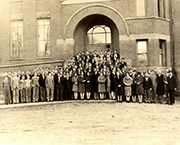Modern Slavery Fighter
BY TOM KERTSCHER

QUINN NEELY
Alyssa Currier, assistant special counsel for the Human Trafficking Institute, meets with Elizabeth Nahamya, a former judge of the High Court of Uganda. Nahamya adjudicated the first international human trafficking case in Uganda.
The pivotal moment for Alyssa Currier ’14 occurred when Northwestern College brought International Justice Mission to campus. The group, which describes itself as the world’s largest anti-slavery organization, showed a video about human trafficking and their efforts in the legal system to fight it.
“The video featured the role of attorneys, which initially got me thinking about law school,” Currier recalls. “I liked the idea of bringing a specialized skill set to international development work.”
Currier, who majored in political science and Spanish, is now assistant special counsel of the Human Trafficking Institute, which is based outside of Washington, D.C. She fights trafficking in Kampala, Uganda, advising prosecutors how to investigate and convict traffickers.
Human trafficking—often called modern-day slavery—is so insidious that even when it is discovered, it can be exceedingly difficult to eradicate. Sometimes the trauma suffered by the victims “impacts the way they’re able to recall what happened to them and it impacts the level of trust they have with the prosecutors and police,” Currier says. “Those victim-witnesses are key to the success of the prosecution, but they often face some of the most difficult challenges participating in the case.”
The Human Trafficking Institute was founded in 2015 by John Cotton Richmond, now ambassador-at-large for the U.S. State Department’s Office to Monitor and Combat Human Trafficking, and Victor Boutros, a former federal prosecutor with the U.S. Justice Department’s Human Trafficking Prosecution Unit. The founding was influenced by a story Boutros heard years earlier about a 12-year-old girl from India who, after working for a summer to earn money for her family, was kidnapped and forced into prostitution.
According to the institute, trafficking is the fastest-growing criminal enterprise in the world, with traffickers earning more annual profits than Apple, JP Morgan, Samsung, Wells Fargo and Microsoft combined. And in developing countries, “traffickers are more likely to be struck by lightning than go to jail for openly owning a slave.”
According to the latest estimate by the International Labour Organization, in 2016 there were 24.9 million victims of forced labor in the world—people “forced to work under threat or coercion as domestic workers, on construction sites, in clandestine factories, on farms and fishing boats, in other sectors, and in the sex industry.”
“Everyone agrees that no one should have ever been enslaved—and certainly not today, when it’s technically illegal in every country,” says Currier, who co-wrote the institute’s 2018 Federal Human Trafficking Report.
Currier says when it comes to forced labor or forced prostitution, there are services that combat the poverty and domestic violence that make girls and women vulnerable to trafficking, and there are services available to trafficking victims. “But there are not a lot of organizations addressing the middle ground, which is the traffickers themselves, and building up a capacity for law enforcement and prosecutors to actually make it unattractive for someone to violate trafficking law,” she says.
The institute, which also works in Belize, trains law enforcement professionals in the specialized work of investigating and prosecuting human traffickers, including finding the perpetrators, developing search warrants and working with victims.
The institute advocates a model its founders helped develop and implement at the Department of Justice to improve the U.S. federal response to prosecuting traffickers. In a pilot project, six U.S. districts saw the number of human traffickers charged increase by 114%, while the remaining 88 districts saw only a 12% increase.
One recent sign of progress: Last year, criminal charges were filed against Bernhard Bery Glaser, a German national accused of sexually abusing and trafficking girls in Uganda. Glaser allegedly lured girls to his home under the guise of providing assistance to victims of sexual abuse but had evaded prosecution for several years.
Before joining the Human Trafficking Institute, Currier was an attorney at the United Nations High Commissioner for Refugees as part of the U.S. protection and resettlement unit in Washington, D.C. A graduate of The George Washington University Law School, she also worked for the refugee program at the nonprofit Human Rights Watch, advocated on behalf of forcibly displaced women with International Justice Mission in Uganda, and represented victims of human rights abuses before the International Criminal Court in The Hague.
“The focus on social justice at Northwestern was invaluable, and it is something I would encourage everyone there to continue,” she says. “Showing students how they can use their degrees to impact social justice causes is really important.”

 Meet 10 alumni who are leading lives of significance. As they heal bodies and minds, spread the gospel and empathy, and fight human trafficking and pornography, they stand out.
Meet 10 alumni who are leading lives of significance. As they heal bodies and minds, spread the gospel and empathy, and fight human trafficking and pornography, they stand out. For 25 years, Northwestern athletes have been making Raider Magic in the Bultman Center. Here are some of the most memorable moments.
For 25 years, Northwestern athletes have been making Raider Magic in the Bultman Center. Here are some of the most memorable moments. High school psychology teacher Ali Ter Horst won $25,000 for inspiring students through innovative instruction, high expectations and vulnerability.
High school psychology teacher Ali Ter Horst won $25,000 for inspiring students through innovative instruction, high expectations and vulnerability. When Reformed Church leaders suggested in 1932 that Northwestern Junior College close temporarily, the Board of Trustees responded with an emphatic no.
When Reformed Church leaders suggested in 1932 that Northwestern Junior College close temporarily, the Board of Trustees responded with an emphatic no.
Classic Comments
All comments are moderated and need approval from the moderator before they are posted. Comments that include profanity, or personal attacks, or antisocial behavior such as "spamming" or other inappropriate comments or material will be removed from the site. We will take steps to block users who violate any of our terms of use. You are fully responsible for the content that you post. Comments posted do not reflect the views or values of Northwestern College.